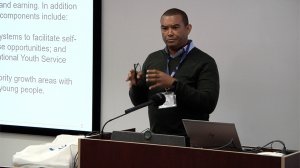Youth require collaborative, agile approach to skills to benefit from economic opportunities

Presidency hopes to ignite jobs for youth through Presidential Youth Employment Initiative
The planning that goes into skills development cannot be linear, owing to it being difficult to determine upfront what skills will be needed in the medium- and long term, and it therefore requires a move away from the prevalent silo-based approach that currently prevails, University of the Witwatersrand Centre for Researching Education and Labour skills development research chairperson Stephanie Allais said this week.
As such, she advocated, education role-players needed to be embedded into economic planning processes. For example, where there were industrial planning processes, policymakers from education systems, educational providers or labour market intermediaries should be involved in these, as well as the other processes around building the economy.
This could ensure that decisions related to industrial transformation were supported by skills provision.
However, the education system was challenged by time constraints, as adapting education programmes took time, with short-term responses to meet any short-term change in skills demand difficult to cater to.
To this extent, Allais noted that constant attention to reforming education and training provision undermined education provision as it created a constantly shifting policy environment.
She said planning that required short-term responses needed ongoing and direct relationships between educational providers and employers, as well as institutional capacity in both.
In the case of long-term planning, planning for narrow or specific skills also worked against the interests of both prospective workers and employers, because of inevitable changes in the work environment.
To address the situation, Allais said skills planning needed to be incorporated into an ongoing process of engagement in different ways and at different levels of the economic system and the education and training system.
This would help to ensure skills were seen as less of an add-on or as a list of projected skills to be produced to support an industrial development strategy.
However, this approach required skills providers and employers to develop better insight into their needs and capacities. This could be developed through working together on the provision and delivery of specific programmes and by ensuring that formal programmes and on-the-job training complemented each other, she noted.
PRESIDENTIAL INITIATIVE
The Presidency, acting not as an implementing agent but as a coordinating structure, is seeking to streamline the process of getting young people out of a learning environment and directly into an earning environment, putting their newfound skills to work in a modern work environment.
The Presidency hopes to realise these goals through its Presidential Youth Employment Initiative (PYEI), which the department has been developing and refining over the past two years, Presidency project management office head Rudi Dicks said.
The initiative was designed to be a mechanism to get young people, fresh out of secondary or tertiary education, into a form of employment and not necessarily formal employment - for example, entrepreneurship and self-employment.
The PYEI is also looking to solve issues around demand-led skills training. “This is something we think is an opportunity we are able to build on [so that we can] see skills training from a different perspective; instead of the traditional form of supply models of skills where we churn out the skills and hope for young people to find employment,” he said.
The Presidency was also looking to revitalise the National Youth Service, as well as implement a number of interventions on priority growth areas with employment potential for young people, added Dicks.
Central to the PYEI’s efforts is establishing a National Pathway Management Network that guides young people towards opportunities for learning and then earning,
Other critical components of the PYEI are demand-led skilling, the enablement of local ecosystems to facilitate self-employment and enterprise opportunities.
Special attention was being paid to demand-led skills development, and in this vein, the PYEI intended to develop an agile and young workforce in in-demand fields, as well as improve the responsiveness of the skilling system and its ability to adapt as work environments change, he said.
These interventions are being led by the Department of Higher Education and Training, and are being implemented through its skills strategy that falls under the Economic Recovery and Reconstruction Plan.
As such, the PYEI has established demand-led skilling workstreams to test a new approach to short-term skills planning.
To improve its chances of success, PYEI is piloting a pay-for-performance incentive model in which only youth who are employed, after going through the system, are paid for.
“[Money] is given towards sector education and training authorities to train people. [They] are paid on the basis of how many people [they] train, but you are not quite sure what the outcome is on that training,” explained Dicks.
In its model, however, the PYEI will pay educational institutions on the basis of placement in employment. “We pay [training authorities] to train people on a performance model where the impact is that person [finding employment as a direct result of their training],” he said.
Article Enquiry
Email Article
Save Article
Feedback
To advertise email advertising@creamermedia.co.za or click here
Comments
Announcements
What's On
Subscribe to improve your user experience...
Option 1 (equivalent of R125 a month):
Receive a weekly copy of Creamer Media's Engineering News & Mining Weekly magazine
(print copy for those in South Africa and e-magazine for those outside of South Africa)
Receive daily email newsletters
Access to full search results
Access archive of magazine back copies
Access to Projects in Progress
Access to ONE Research Report of your choice in PDF format
Option 2 (equivalent of R375 a month):
All benefits from Option 1
PLUS
Access to Creamer Media's Research Channel Africa for ALL Research Reports, in PDF format, on various industrial and mining sectors
including Electricity; Water; Energy Transition; Hydrogen; Roads, Rail and Ports; Coal; Gold; Platinum; Battery Metals; etc.
Already a subscriber?
Forgotten your password?
Receive weekly copy of Creamer Media's Engineering News & Mining Weekly magazine (print copy for those in South Africa and e-magazine for those outside of South Africa)
➕
Recieve daily email newsletters
➕
Access to full search results
➕
Access archive of magazine back copies
➕
Access to Projects in Progress
➕
Access to ONE Research Report of your choice in PDF format
RESEARCH CHANNEL AFRICA
R4500 (equivalent of R375 a month)
SUBSCRIBEAll benefits from Option 1
➕
Access to Creamer Media's Research Channel Africa for ALL Research Reports on various industrial and mining sectors, in PDF format, including on:
Electricity
➕
Water
➕
Energy Transition
➕
Hydrogen
➕
Roads, Rail and Ports
➕
Coal
➕
Gold
➕
Platinum
➕
Battery Metals
➕
etc.
Receive all benefits from Option 1 or Option 2 delivered to numerous people at your company
➕
Multiple User names and Passwords for simultaneous log-ins
➕
Intranet integration access to all in your organisation


















